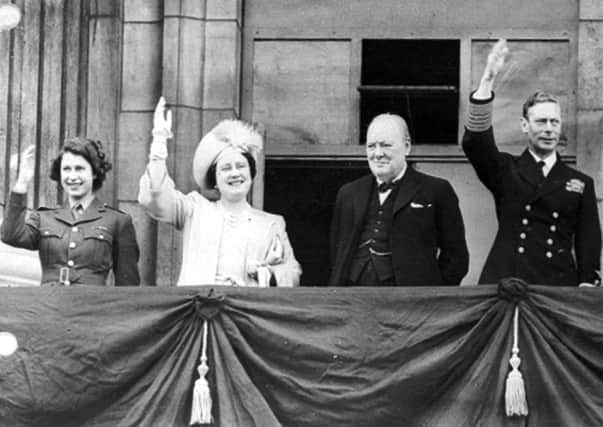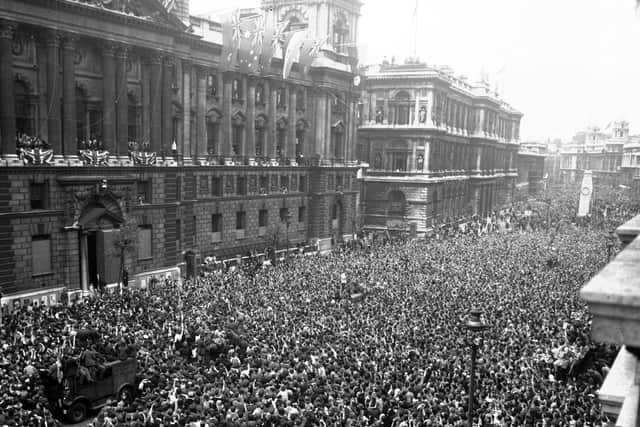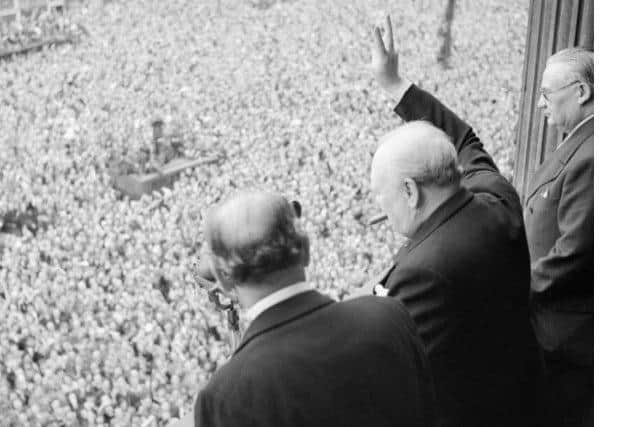What the Second World War generation can teach us today – Bill Carmichael


The two events are very different for lots of varied reasons and I’ll try my best to resist the temptation to bang on about the “Blitz spirit” too much.
But that doesn’t mean we can’t learn lessons about the massive hole our country found itself in 75 years ago and how, slowly and painfully, we dragged ourselves out of it.
Advertisement
Hide AdAdvertisement
Hide AdI suspect, like me, many of you will be watching those terrific newsreels recording that joyous occasion when victory was finally secured over a pitiless and vicious enemy.


They show bunting festooned outdoor parties, dancing in the streets, bonfires and ringing of church bells, and handsome soldiers passionately kissing pretty girls they had met only minutes before.
Given the terrible privations, dangers and sacrifices they had to face over almost six years, I think we should forgive them for letting their hair down a bit in a moment of cathartic release and gratitude.
As Prime Minister Winston Churchill said in his announcement of the unconditional surrender of Nazi forces: “We may allow ourselves a brief period of rejoicing. Advance Britannia! Long live the cause of freedom! God save the King!”
Advertisement
Hide AdAdvertisement
Hide AdLater he appeared on the balcony of Buckingham Palace saluting the cheering crowds alongside the King, the Queen and the then Princess Elizabeth, looking very smart in her ATS uniform. I challenge you to look at those scenes without a lump coming to your throat.


But the wild celebrations couldn’t disguise a very ugly reality – Britain was completely broke, utterly bankrupt, with massive debts and a wrecked economy.
The war had claimed more than 400,000 British lives, including an estimated 60,000 dead from Luftwaffe air raids on British cities, exports had shrunk to virtually zero and there were serious concerns over whether people could get enough to eat (although hunger was much worse in many parts of mainland Europe).
And things were about to get even worse. In 1946 bread was rationed – something that had not happened during the war years – and rationing didn’t fully end until 1954.
Advertisement
Hide AdAdvertisement
Hide AdThe UK came perilously close to total collapse. When the US suddenly terminated the Lend-Lease Agreement in 1945, which guaranteed essential food and fuel supplies, the newly-elected Labour government was only saved from disaster when the economist, John Maynard Keynes, in one of his last acts before his death, negotiated a life-saving £3bn loan from the US.
That, and the Marshall Plan from 1948 onwards, kept the UK afloat – just about. We only paid off the debt to the US and Canada in 2006.
But here is the incredible thing about that wartime generation. Yes, there was an absolutely heroic resilience, a commitment to freedom, and a defiance of fascism.
And yes, the disaster of Dunkirk, the bravery displayed on D-Day and the spirit of the Blitz (sorry) is testament to the fortitude of this country.
Advertisement
Hide AdAdvertisement
Hide AdBut here is where I think we can learn a lesson from our forebears in the time of lockdown. Even in the darkest times of the Second World War they were looking forward to a brighter future, and how to build a better society.
For example in 1942, when the UK was facing the fascist threat virtually alone, we produced the Beveridge report, which anticipated the creation of the welfare state, aimed at abolishing the five evils of want, disease, ignorance, squalor and idleness.
By 1948 that reforming Labour government, led by Clement Attlee, had created the National Health Service.
So I love that wartime generation – the generation of my mother and father – for their incredible sacrifices to overcome the authoritarianism of the far left and the far right. I love you and from my heart I thank you for it.
Advertisement
Hide AdAdvertisement
Hide AdBut even better is the fact you had an amazing vision of how to build a better society for your children and grandchildren and were prepared to work hard to make that happen.
So my friends, on this magnificent VE-Day, let us raise a glass to celebrate that marvellous generation who defeated fascism and communism and laid the foundations for the free and prosperous society we enjoy today.
Editor’s note: first and foremost - and rarely have I written down these words with more sincerity - I hope this finds you well.
Almost certainly you are here because you value the quality and the integrity of the journalism produced by The Yorkshire Post’s journalists - almost all of which live alongside you in Yorkshire, spending the wages they earn with Yorkshire businesses - who last year took this title to the industry watchdog’s Most Trusted Newspaper in Britain accolade.
Advertisement
Hide AdAdvertisement
Hide AdAnd that is why I must make an urgent request of you: as advertising revenue declines, your support becomes evermore crucial to the maintenance of the journalistic standards expected of The Yorkshire Post. If you can, safely, please buy a paper or take up a subscription. We want to continue to make you proud of Yorkshire’s National Newspaper but we are going to need your help.
Postal subscription copies can be ordered by calling 0330 4030066 or by emailing [email protected]. Vouchers, to be exchanged at retail sales outlets - our newsagents need you, too - can be subscribed to by contacting subscriptions on 0330 1235950 or by visiting www.localsubsplus.co.uk where you should select The Yorkshire Post from the list of titles available.
If you want to help right now, download our tablet app from the App / Play Stores. Every contribution you make helps to provide this county with the best regional journalism in the country.
Sincerely. Thank you.
James Mitchinson
Editor
Comment Guidelines
National World encourages reader discussion on our stories. User feedback, insights and back-and-forth exchanges add a rich layer of context to reporting. Please review our Community Guidelines before commenting.